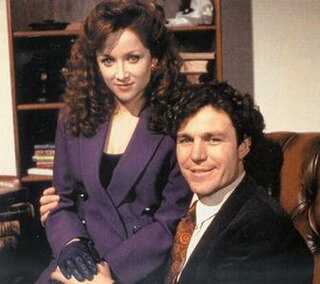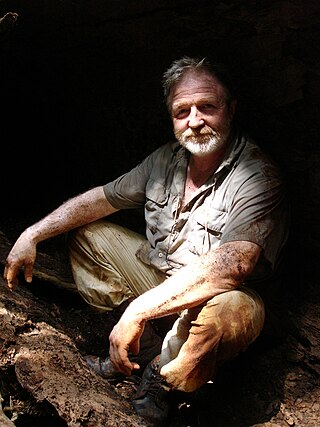Related Research Articles
Michael Fenton Stevens is an English actor and comedian. He was a founder member of The Hee Bee Gee Bees and sang the lead on the Spitting Image 1986 number 1 hit "The Chicken Song". He also starred in KYTV, its Radio 4 predecessor Radio Active, Benidorm, and was an anchor on 3rd & Bird on CBeebies.
"The Cage" is the first pilot episode of the American television series Star Trek. It was completed on January 22, 1965. The episode was written by Gene Roddenberry and directed by Robert Butler. It was rejected by NBC in February 1965, and the network ordered another pilot episode, which became "Where No Man Has Gone Before". Much of the original footage from "The Cage" was later incorporated into the season 1 two-part episode "The Menagerie" (1966); however, "The Cage" was first released to the public on VHS in 1986, with a special introduction by Gene Roddenberry, as a hybrid of the color footage that was used in "The Menagerie" and black and white footage which was not used in "The Menagerie". It was not broadcast on television in its complete all-color form until 1988. The black and white version and all-color version were also released in various standard-definition media including LaserDisc, VHS, and DVD formats.
Cold Lazarus is a four-part British television drama written by Dennis Potter with the knowledge that he was dying of pancreatic cancer. It forms the second half of a pair with the television serial Karaoke.

Lynne Truss is an English author, journalist, novelist, and radio broadcaster and dramatist. She is arguably best known for her championing of correctness and aesthetics in the English language, which is the subject of her popular and widely discussed 2003 book, Eats, Shoots & Leaves: The Zero Tolerance Approach to Punctuation. The book was inspired by a BBC Radio 4 show about punctuation, Cutting a Dash, which she presented.

Timewatch is a long-running British television series showing documentaries on historical subjects, spanning all human history. It was first broadcast on 29 September 1982 and is produced by the BBC.
The Ark in Space is the second serial of the 12th season of the British science fiction television series Doctor Who, which was first broadcast in four weekly parts on BBC1 from 25 January to 15 February 1975.
Future Fantastic was a British documentary television series which premiered in 1996. This show looked at the how science and science fiction complement each other, and how ideas and technologies from the past are helping to shape our future. The series was narrated by Gillian Anderson and co-produced by the British Broadcasting Corporation, The Learning Channel and Pro Sieben.

The Sarah Jane Adventures is a British science fiction television programme that was produced by BBC Cymru Wales for CBBC, created by Russell T Davies, and starring Elisabeth Sladen. The programme is a spin-off of the long-running BBC science fiction programme Doctor Who and is aimed at a younger audience than Doctor Who. It focuses on the adventures of Sarah Jane Smith, an investigative journalist who, as a young woman, had numerous adventures across time and space with the Doctor. Following Sladen's death in 2011, the BBC confirmed that the show would not return for a sixth series.
One Foot in the Past is a British television series on BBC2 that ran from 1993 to 2000. It considered conservation in, and the architecture, heritage and history of, the British Isles and, in three episodes, France, Italy and India. The series was a magazine programme. Each programme ran for 30 minutes.
Secret History is a long-running British television documentary series. Shown on Channel 4, the Secret History brandname is still used as a banner title in the UK, but many of the individual documentaries can still be found on US cable channels without the branding. It can be seen as Channel 4's answer to the BBC's Timewatch. The series returned to Channel 4 on 10 November 2013 after a nine-year break.

Virtual Murder is an investigative drama series shown on BBC television in 1992. It starred Nicholas Clay as Dr John Cornelius, a psychology lecturer at a provincial university, and Kim Thomson as his partner, Samantha Valentine.
War Walks is a BBC television documentary series presented by the historian Richard Holmes, then Professor of Military and Security Studies at Cranfield University. The series is about battlefields, which are visited by Holmes, and is also about the corresponding battles. The series covers twelve battles. Both the first and the second series are about battles fought by British or English forces. Nine of these were fought against German, French or Norman forces. The other three are from British or English civil wars.
Inspector Steine is a radio comedy drama series written by Lynne Truss and produced by Sweet Talk for BBC Radio 4. The producer is Karen Rose and music is by Anthony May.
CNN Millennium or Millennium: A Thousand Years of History or MM Millenium or Millennium is a CNN Perspectives television series or miniseries about world history during the 2nd millennium from the 11th to the 20th centuries.

George C. McGavin is a British entomologist, author, academic, television presenter and explorer.

"The Rings of Akhaten" is the seventh episode of the seventh series of the British science fiction television series Doctor Who, first broadcast on BBC One on 6 April 2013. It was written by Neil Cross and directed by Farren Blackburn.

Inside No. 9 is a British black comedy anthology television programme that first aired on 5 February 2014. It is written by Steve Pemberton and Reece Shearsmith and produced by the BBC. Each 30-minute episode is a self-contained story with new characters and a new setting, almost all starring Pemberton or Shearsmith. Aside from the writers, each episode has a new cast, allowing Inside No. 9 to attract a number of well-known actors. The stories are linked only by the number 9 in some way, typically taking the form of a door marked with the number 9, and a brass hare statue that is in the background of all episodes. Themes and tone vary from episode to episode, but all have elements of comedy and horror or perverse humour, in addition to a plot twist. Pemberton and Shearsmith took inspiration for Inside No. 9 from an episode of Psychoville, a previous project, which was filmed in a single room – this in turn was inspired by Alfred Hitchcock's Rope.
Match of the Seventies is a British sports documentary television series broadcast on BBC1 in two series between 26 July 1995 and 2 September 1996. Presented by Dennis Waterman it featured highlights of the English football seasons during the 1970s. It begins in the summer of 1970, shortly after England's defeat in the World Cup in a season in which Arsenal won the double and concludes at the end of the 1979-1980 season with an increasingly dominant Liverpool side retaining their league title.
Bug City is a 1998 educational children's series hosted by entomologist Art Evans, actress Christina Ricci and the puppet character "Bugsy Seagull", voiced by Chuck McCann. It was released on VHS by Schlessinger Media.
References
- "Television and Video" in "Teaching Resources". Resh and Carde (eds). Encyclopedia of Insects. Academic Press. 2003. p 1115.
- Lucy Ellmann, "Fat and feminist issues", The Independent, 18 February 1996
- Thomas Sutcliffe, "Review", The Independent, 1 March 1996
- Seth Goldstein, "Alien Empire Creeping Into Stores" in "Picture This", Billboard, 24 February 1996, p 56
- "Documentary: Alien Empire" in "Reviews & Previews", Billboard, 24 February 1996, p 89
- "The West and the World of Insects", Billboard, 25 October 1996, p 76
- Caitlin Lovinger, "Spotlight: Small World", New York Times, 11 February 1996, Section 12, p 21
- Walter Goodman, "TV Weekend; Sex, Beauty, Home and Travel Tips on Bugs", New York Times, 9 February 1996, Section D, p 17
- Lee Harris, "Weekend TV: An All-Star Sunday for NBA and Movies", Los Angeles Times, 10 February 1996
- Mary Stevens, "Bugs abound in Alien Empire", Chicago Tribune, 15 March 1996
- (1996) 62 Quill & Quire 6
- "Alien Empire" (1996) 15 International Documentary 9
- The New Yorker. Google
- 1 2 BBC Programme Index
- ↑ For reviews of this episode, see Peter Waymark, "Alien Empire" in "Choice", The Times, 15 February 1996, p 43; and Lynne Truss, "Mismatched music guilty of sonic insecticide", The Times, 16 February 1996, p 43
- ↑ Radio Times, Issue 3759, 10 February 1996, reprinted at BBC Programme Index
- ↑ For a review of this episode, see Lynne Truss, "Number-crunching is the insects' buzz word", The Times, 23 February 1996, p 39
- ↑ Radio Times, Issue 3760, 17 February 1996, reprinted at BBC Programme Index
- ↑ For a review of this episode, see Peter Waymark, "Alien Empire: Battle Zone" in "Choice", The Times, 29 February 1996, p 47.
- ↑ Radio Times, Issue 3761, 24 February 1996, reprinted at BBC Programme Index
- ↑ Radio Times, Issue 3762, 2 March 1996, reprinted at BBC Programme Index
- ↑ For a review of this episode, see Lynne Truss, "Ladies, mistresses and dominant females", The Times, 15 March 1996, p 43.
- ↑ Radio Times, Issue 3763, 9 March 1996, reprinted at BBC Programme Index
- ↑ Radio Times, Issue 3764, 16 March 1996, reprinted at BBC Programme Index
- ↑ Helen Ashton (2003) 17 Reference Reviews 42
- ↑ McCormick, Moira (December 19, 1998). "A Bug Invasion Hits Video Shelves". Billboard. p. 63.
- ↑ For reviews of this book, see (1996) 9 New Statesman Society 39; (1996) 149 New Scientist, 27 January 1996, p 44; and "Insecticide: Christopher O'Toole", Times Higher Education, 22 March 1996; For other commentary on this book, see Rupp, The Complete Home Learning Sourcebook, Three Rivers Press, 1998, p 287.